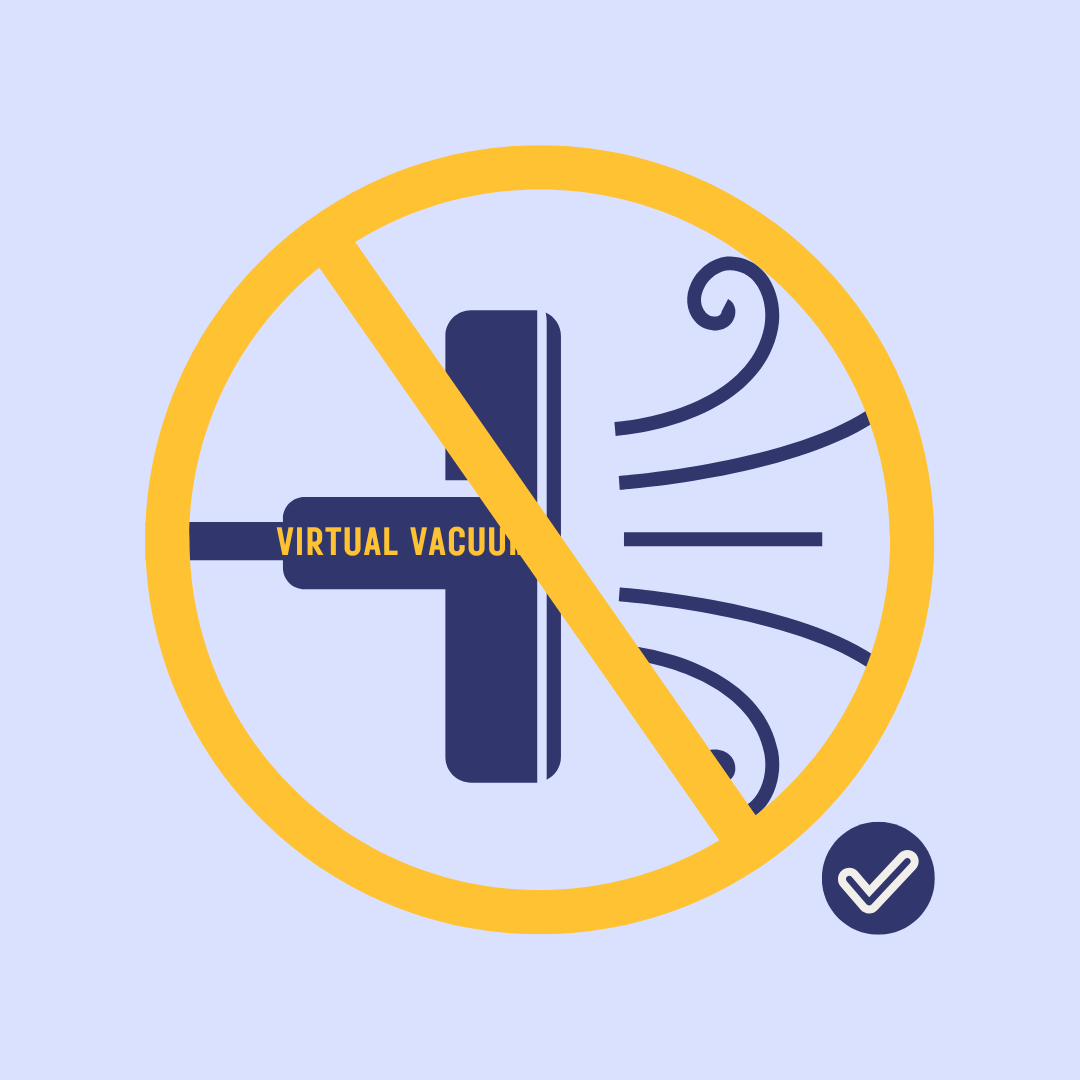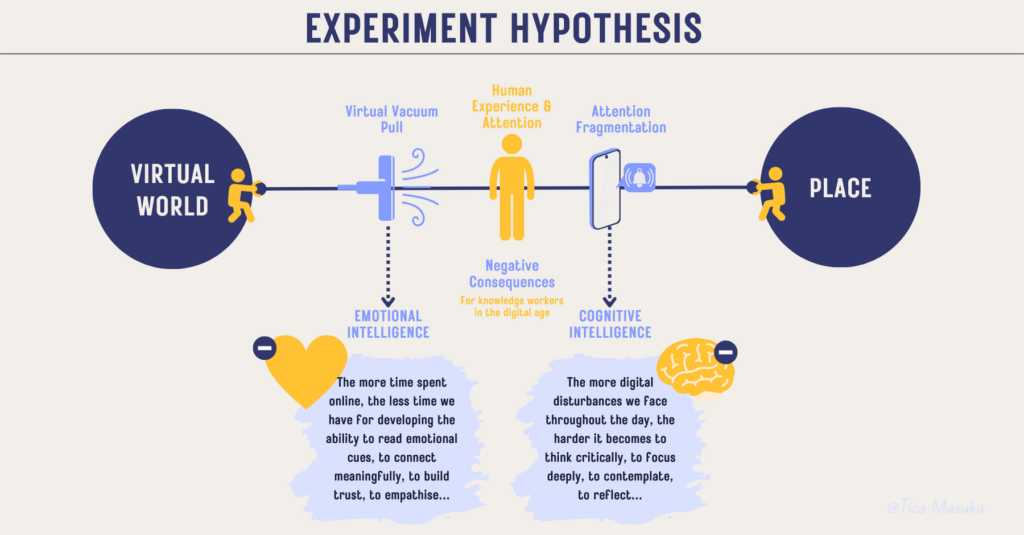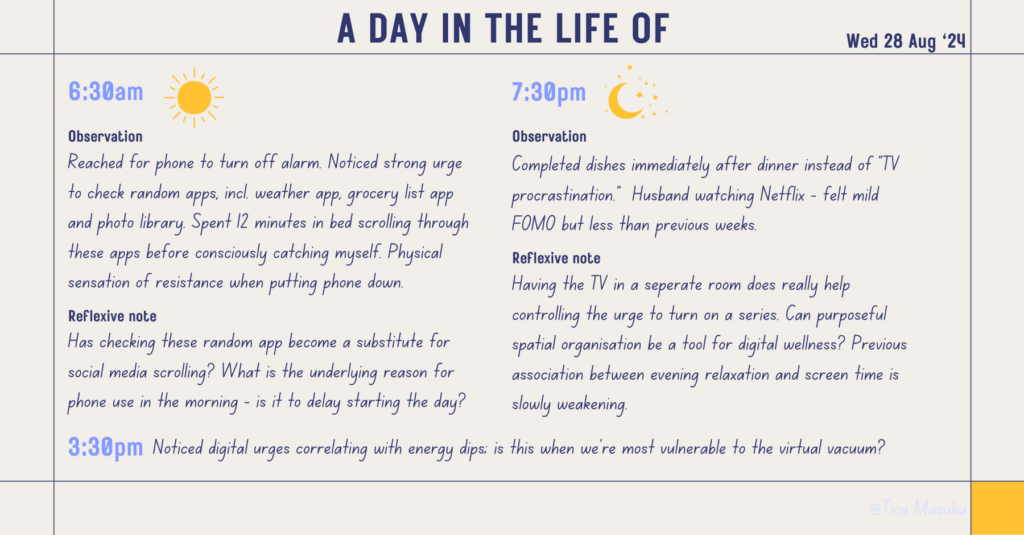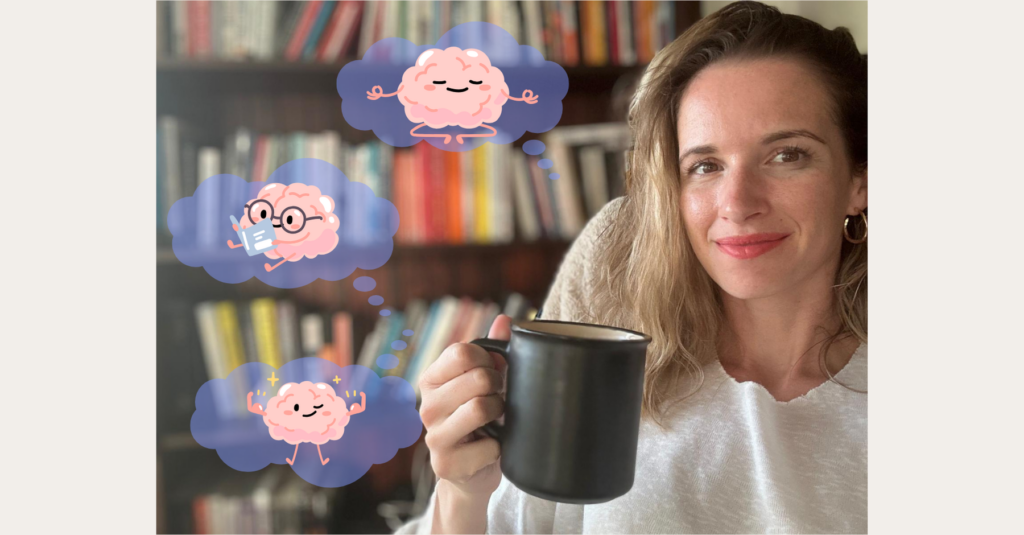
100-Day Experiment Completed
Virtual Vacuum Cleanse On August 1st, 2024, I began the virtual vacuum experiment driven by a combination of workplace observation & personal frustration; As a knowledge worker myself, I started wondering why, after spending our workdays interfacing with screens, we feel compelled to continue this digital immersion during our leisure time as well? Aside from […]
Virtual Vacuum Cleanse
On August 1st, 2024, I began the virtual vacuum experiment driven by a combination of workplace observation & personal frustration;
- Observation: Over the years, I observed that the user experience in workplaces is very much being altered by how (and how often) users engage in the digital realm. I noted that this shifts their awareness from being conscious in the physical world, to being more immersed in this digital space – often either wittingly or unwittingly traversing the two with ease.
- Frustration: Personally, I became increasingly more frustrated with time wasted on social media platforms, and rather useless (but engaging) TV/Netflix shows – relegating consciousness of both time & place to the background.
As a knowledge worker myself, I started wondering why, after spending our workdays interfacing with screens, we feel compelled to continue this digital immersion during our leisure time as well?
Aside from the obvious health-implications of digital-centric lifestyles (sedentary behaviour, eye-strain and loneliness to name a few), I started questioning whether there may be some more specific consequences for knowledge workers in particular…
Research Hypotheses
The first hypothesis in my theory is that the virtual and physical worlds are at odds with each other, they are engaged in a tug-of-war, where both worlds are fighting for human attention & our daily experience.
I then hypothesised two critical consequences for knowledge workers on the effect of unbalanced time spent in the virtual space:
- Emotional Intelligence: The more time we spend online, the less time we have for developing our emotional intelligence; the ability to read emotional cues, to connect meaningfully, to build trust, to empathise…
- Cognitive Intelligence: The frequent digital disturbances we encounter during the day, and the constant pull from the ‘virtual vacuum’ for our attention/experience, diminishes our abilities to think critically, to focus deeply, to contemplate, to reflect…

Based on my hypothesis, I believe we need to get control back over the time we spend in the virtual realm so we can rebalance this tension between our experience in the virtual and physical worlds, to ultimately ensure we keep developing our emotional and cognitive intelligence, so that as knowledge workers, we can thrive in the digital age.
In the age of AI, the human competitive advantage is more important than ever before. How are we going to work with AI, and reflect on its outcomes, if we ourselves are living life through the lens of a rectangle (a.k.a. screen)? We need to take control back, so we can cultivate our human-originated intelligence.
So then, considering all of the above, what is the role of place in the digital age? Instead of our experience of place fading towards the background as the digital realm takes centre stage, could place become the antidote to the virtual vacuum’s relentless pull? Could a stronger sense of place rebalance the tug of war and therefore, in turn, support developing knowledge workers’ emotional & cognitive intelligence?
A Day in the Life during the Virtual Vacuum Cleanse Experiment
In order to get control back. I decided to undertake an autoethnographic experiment: 100-day Virtual Vacuum Cleanse. I wanted to test for myself what it would be like to reduce my screen time significantly and regain control over the time spent online. In order to do that I decided, for the next 100 days to:
- not watch any Netflix, TV, or other series (the TV screen had become a no-go zone)
- not mindlessly scroll social media (I deleted most social media apps from my phone, and put on a timer for LinkedIn).
- reduce phone notifications to a minimum (the minimalist phone app worked wonders for me)
- Outside of work, only engage with screens in mindfully set periods of time for a specific purpose
As I mentioned in an earlier article about the virtual vacuum – I was kind of nervous to start the experiment. I tried doing a similar experiment earlier this year, and I failed miserably. I caved after just 14 days! The moment I failed was after an incredibly busy workweek, and I felt like I just ‘deserved’ TV time, knowing full well that many non-virtual activities would have actually made me feel better than slouching on the couch watching a series.
So, what was it actually like to undertake this experiment? Below you’ll find some observations early on in the experiment that describe how I experienced the daily pull between the uncontrolled digital urges and the conscious limitations I had enforced upon myself.

In the above ‘day in the life of’, you’ll notice that I started to pick up on some insights already in relation to the aforementioned hypothesis. However, I will go deeper into these insights in another dedicated article that I’m currently writing – revealing how digital urge patterns might relate to time, place and human intelligence.
For now though, I will share three reflections with you that I uncovered on the personal side of going through this experiment:
- Screen-time has become like the ‘soma’ from Brave New World – a (digital) sedative we think we need. After a hard day’s work, it’s oh so compelling to turn on a series and lay on the couch. The first few weeks of the 100-day experiment the desire to do this was very much there, but quite quickly I began to realise that activities like reading a book or puttering around the house are far more relaxing. Reading a book may sound like a lot of work, but as it requires the brain to focus and concentrate, I experienced deeper relaxation by quieting the mental chatter, and focussing on just one thing – the book. Digital relaxation might well be a myth.
- Algorithmic influence on mental real estate: Not accessing social media (aside from LinkedIn for work purposes) was a lot easier than I had envisioned. However, something curious happened – at random points in time, I started thinking about some of the influencers I had followed over a long time: What would Simone be up to? Has Leonie given birth to her second? Is Lienke still working out in the mornings? All these people I have never met, yet I ended up following their lives closely just because mysterious algorithms orchestrated the match so carefully. And now, even when not engaging with social media, these random connections are still taking up precious mental real estate! This realisation definitely reinforced my decision to step away from the platforms and take control back over who and what occupies space in my thoughts.
- Taking back control. Upon reflection on the 100-days, it’s perhaps not so much about spending less time online, but it’s about how we spent the time that really matters – consciously & controlled versus mindlessly being controlled.
Now that the experiment is over, I still haven’t watched TV or reinstalled the social media apps, however some other habits have definitely resurfaced. The urge to “just check the news quickly” while having a meal remains strong. It almost feels like ‘wasted time’ to just sit and eat (especially when eating without company) – it’s like if every meal needs a side of digital content for it to be complete! While staying informed is important, I’m still working on finding that sweet spot between being an informed citizen and using news as a mealtime distraction.

In closing
This 100-day experiment has been somewhat liberating. My devices have mostly returned to their proper role – as tools I control, and not the other way around. It feels good to ‘reclaim’ control from the algorithms that were once not so subtly influencing my daily life experience.
I’m excited to soon share with you the real meaty insights from this experiment. Till then, stay tuned – mindfully:)
Nov 23, 2024
Tica Masuku
|
[🎤Are you looking for a keynote speaker for your next event, company off-site or global summit? I'm currently organising my international speaking calendar for 2025. Please get in touch to discuss the possibilities tica.m@spaceful.com.au]
[💡Would you like to know how I can help you or your organisation apply a human geography informed strategy to your workplace? I'm the Director of Workplace Strategy at Spaceful. We assist organisations design and develop bespoke and evidence-based workplace strategy solutions. You can email me at tica.m@spaceful.com.au]
You'll get...
Thank You for Subscribing!
Website designed by Creative Vibes
2025 © Copyright Tica Masuku